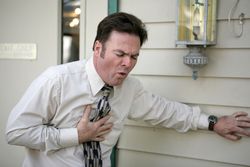4 FAQ About Testicular Cancer

Testicular cancer has almost a 95% remission rate, but early detection through medical providers is critical to recovery. Because the symptoms of testicular cancer are usually subtle, it’s easy for the disease to go undetected until the cancerous cells spread to other parts of the body. The following guide explains the disease and how to stay alert.
Common Questions About Testicular Cancer
What is it?
A gene mutation can cause a person’s cells to divide too quickly, producing a tissue mass called a tumor. The cells that make up the tumor are abnormal, and can spread to other parts of the body. When this process begins in the testicles, it’s called testicular cancer.
What are the risk factors?
If you have a family history of testicular cancer, you could have an above-average risk of developing the disease. It’s also more common among people who are white, in their 20s or 30s, or HIV-positive. An undescended testicle, which isn’t visible in the scrotum, can also increase a person’s risk.
Having one or several of these risk factors doesn’t mean you’ll develop testicular cancer. However, you should talk to a medical provider about your concerns and follow their recommendations for screenings.
What are the signs of this type of cancer?
 Painless lumps or enlargement of the testicles may indicate tumors. Pain in the lower back or shortness of breath and coughing may be signs that cancerous cells have spread to other parts of the body.
Painless lumps or enlargement of the testicles may indicate tumors. Pain in the lower back or shortness of breath and coughing may be signs that cancerous cells have spread to other parts of the body.
What is the screening process like?
Testicular self-exams (TSE) are your first line of defense. About once a month, examine your groin area for lumps or swelling. Gently cup one testicle with both hands and roll it between your thumb and forefingers. If you notice any changes in shape, size, or skin texture, or experience persistent aching and heaviness, talk with your medical provider.
Medical providers detect this type of cancer through blood tests and ultrasounds.
Annual screenings ensure patients receive treatment as early as possible. For testicular cancer screenings, visit Hillside Family Medicine in Anchorage, AK. These medical providers provide a range of exams to help you stay healthy. For your convenience, they also have an onsite lab to ensure prompt results. Learn more about their practice online or call (907) 344-0200 to schedule an appointment.
About the Business
Have a question? Ask the experts!
Send your question

